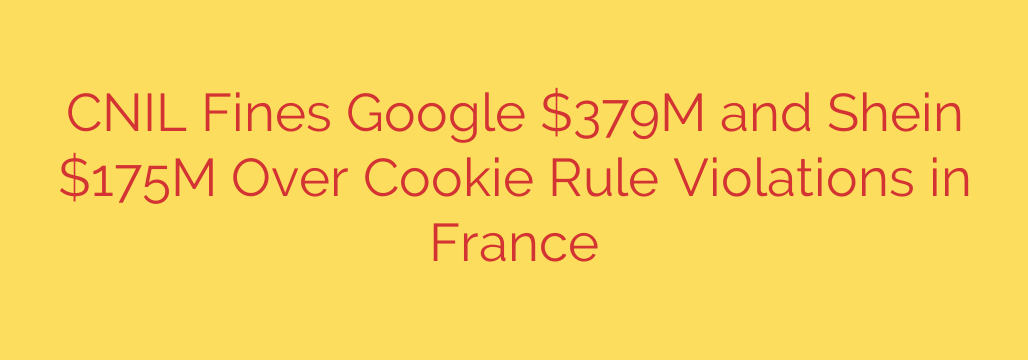
France Hits Google and Shein with Over $550M in Fines for Cookie Violations
In a significant move to enforce digital privacy rights, France’s data protection authority, the CNIL, has levied massive fines against two major global companies for non-compliant cookie consent practices. Google was fined approximately $379 million (€350M), while the fast-fashion giant Shein was ordered to pay around $175 million (€160M), sending a clear message that regulators are cracking down on manipulative and unclear user consent mechanisms.
These penalties highlight a growing intolerance for “dark patterns”—deceptive design choices that nudge users into making decisions they might not otherwise choose, particularly when it comes to accepting tracking cookies. The core of the issue for both companies revolved around making it significantly more difficult for users to reject cookies than to accept them.
The Anatomy of a Cookie Violation
For any business operating online, understanding the missteps that led to these fines is critical for ensuring compliance and building user trust. The CNIL’s investigations revealed several key failures in how these platforms managed user consent.
At the heart of the violations was a fundamental imbalance in user choice. Regulators found that users could accept all tracking cookies with a single, convenient click. However, refusing them required navigating through multiple menus and complex options. This asymmetry is considered a direct violation of data protection laws, which mandate that rejecting consent must be as simple and straightforward as giving it.
Furthermore, the information provided to users was often deemed insufficient or unclear. The purpose of the cookies and the extent of the data collection were not transparently communicated, leaving users unable to make a truly informed decision about their privacy.
Key takeaways from the regulatory action include:
- Imbalanced Choices: A one-click “Accept All” button without an equally simple “Reject All” option is no longer acceptable.
- Lack of Transparency: Vague language about how data is used does not meet the standard for informed consent.
- Deceptive Design: Intentionally complex navigation designed to frustrate users into accepting cookies is a prohibited “dark pattern.”
A Warning Shot for All Online Businesses
While the fines against Google and Shein are notable for their size, they represent a much broader trend across Europe. Data protection authorities are actively enforcing the ePrivacy Directive and the General Data Protection Regulation (GDPR), which govern cookie usage and user consent.
This enforcement action serves as a crucial reminder to companies of all sizes: if you have users in the European Union, your website’s cookie consent banner must comply with these strict standards. The era of assuming user consent through inaction or burying rejection options in confusing menus is definitively over. Failure to adapt can result in not only substantial financial penalties but also significant damage to brand reputation.
Actionable Steps for Cookie Consent Compliance
To avoid similar penalties and foster a transparent relationship with your audience, businesses should immediately review and update their cookie consent mechanisms.
- Prioritize Simplicity and Clarity: Ensure your cookie banner uses plain, easy-to-understand language. Clearly state what cookies are used for and provide simple, direct choices.
- Implement an Equal “Reject” Option: The most critical step is to place a “Reject All” button with the same prominence and ease of access as the “Accept All” button.
- Avoid Pre-Ticked Boxes: Consent must be an active, affirmative choice. Never assume consent by using pre-checked boxes for non-essential cookies.
- Provide Granular Controls: Allow users to easily select which categories of cookies they are willing to accept (e.g., analytics, marketing, functional) through a clear “Manage Preferences” link.
- Ensure Easy Withdrawal of Consent: Users must be able to change their minds and withdraw their consent at any time, and this process should be as easy as it was to grant it initially.
Ultimately, these landmark fines underscore a fundamental shift in the digital landscape. User privacy is no longer an afterthought but a legal and ethical obligation. By embracing transparency and prioritizing user choice, businesses can not only ensure compliance but also build the lasting trust that is essential for long-term success.
Source: https://securityaffairs.com/181911/laws-and-regulations/frances-cnil-fined-google-379m-and-shein-175m-for-breaching-cookie-rules.html








